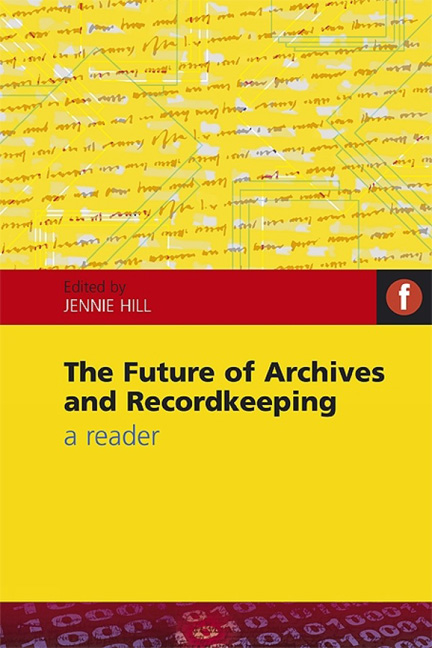Book contents
- Frontmatter
- Dedication
- Contents
- Acknowledgements
- Contributors
- Introduction: seeing the future of archives and recordkeeping
- Part 1 Defining archives
- 1 Where do we come from? What are we? Where are we going? Situating the archive and archivists
- 2 Encounters with the self: archives and research
- 3 Strangely unfamiliar: ideas of the archive from outside the discipline
- Part 2 Shaping a discipline
- Part 3 Archive 20: archives in society
- Part 4 Archives in the information age: is there still a role for the archivist?
- Index
- Miscellaneous Endmatter
- Miscellaneous Endmatter
- Miscellaneous Endmatter
2 - Encounters with the self: archives and research
from Part 1 - Defining archives
Published online by Cambridge University Press: 08 June 2018
- Frontmatter
- Dedication
- Contents
- Acknowledgements
- Contributors
- Introduction: seeing the future of archives and recordkeeping
- Part 1 Defining archives
- 1 Where do we come from? What are we? Where are we going? Situating the archive and archivists
- 2 Encounters with the self: archives and research
- 3 Strangely unfamiliar: ideas of the archive from outside the discipline
- Part 2 Shaping a discipline
- Part 3 Archive 20: archives in society
- Part 4 Archives in the information age: is there still a role for the archivist?
- Index
- Miscellaneous Endmatter
- Miscellaneous Endmatter
- Miscellaneous Endmatter
Summary
Introduction
Over the past few years two diverging tendencies have characterized perceptions of archives from popular and academic perspectives. First, a varied discourse has considered the archive as a sphere of critical debate, in the context of, for example, postmodernism, postcolonialism and museology. Meanwhile to the general public the notion of the archive has become at once more familiar and less fixed, with the term perhaps becoming a kind of stand-in for history or notions of historicity. Both these tendencies have given little attention to the work of the archivist. Tom Nesmith (2002, 28) has discussed the ‘self effacement’ of the archivist, which links to the putative invisibility of the archivist's encounter with the material in their care. But where does this omission from discussions leave archivists? Some have engaged with critical debates, sometimes in response to the new challenges of the digital environment, others through encountering interdisciplinary notions of archives which may be vastly different from their own experience or frame of reference.
The rise of archives in popular culture
This is an interesting time to be an archivist, with archives becoming not only embedded in people's daily lives but also emblematic in political and social culture. In the popular imagination, archives seem to be associated with control, order and stasis; or imagined as dusty basements, treasure troves of dramatic stories and truths untold. Given that archivists are often part of these scenarios, it is important, first, to be aware of how archives are seen by others, and thus what they imagine archives to be, and, second, to consider what archivists would like to be known and understood about their professional work. Although archivists strive for objectivity in their own engagement with the archives for the purposes of cataloguing, many have commented on the invisible impact of the archivist, shaping the archive as it is experienced by the user (see for example Nesmith, 2002, 28). The history of archival theory has tended to focus on the custodial and administrative histories of archives; the Jenkinsonian authority of the text; or Schellenberg's functional appraisal.
- Type
- Chapter
- Information
- The Future of Archives and RecordkeepingA reader, pp. 27 - 40Publisher: FacetPrint publication year: 2010

